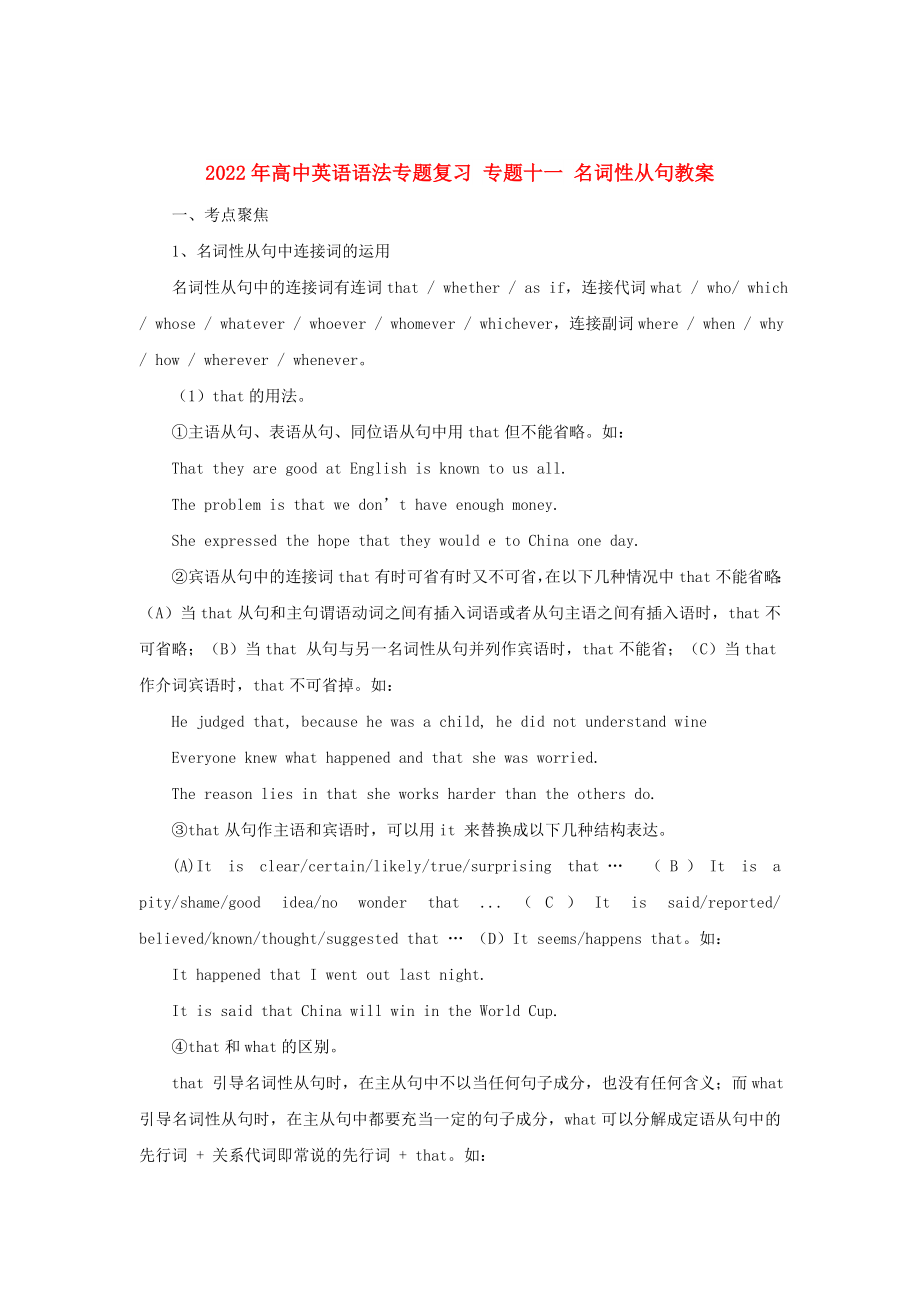《2022年高中英語(yǔ)語(yǔ)法專(zhuān)題復(fù)習(xí) 專(zhuān)題十一 名詞性從句教案》由會(huì)員分享�,可在線閱讀,更多相關(guān)《2022年高中英語(yǔ)語(yǔ)法專(zhuān)題復(fù)習(xí) 專(zhuān)題十一 名詞性從句教案(5頁(yè)珍藏版)》請(qǐng)?jiān)谘b配圖網(wǎng)上搜索�����。
1���、2022年高中英語(yǔ)語(yǔ)法專(zhuān)題復(fù)習(xí) 專(zhuān)題十一 名詞性從句教案
一��、考點(diǎn)聚焦
1���、名詞性從句中連接詞的運(yùn)用
名詞性從句中的連接詞有連詞that / whether / as if,連接代詞what / who/ which / whose / whatever / whoever / whomever / whichever�,連接副詞where / when / why / how / wherever / whenever����。
(1)that的用法。
①主語(yǔ)從句、表語(yǔ)從句��、同位語(yǔ)從句中用that但不能省略����。如:
That they are good at English is known
2、 to us all.
The problem is that we don’t have enough money.
She expressed the hope that they would e to China one day.
②賓語(yǔ)從句中的連接詞that有時(shí)可省有時(shí)又不可省���,在以下幾種情況中that不能省略:(A)當(dāng)that從句和主句謂語(yǔ)動(dòng)詞之間有插入詞語(yǔ)或者從句主語(yǔ)之間有插入語(yǔ)時(shí)�����,that不可省略��;(B)當(dāng)that 從句與另一名詞性從句并列作賓語(yǔ)時(shí)��,that不能?����?;(C)當(dāng)that作介詞賓語(yǔ)時(shí)�,that不可省掉。如:
He judged that, because he
3����、was a child, he did not understand wine
Everyone knew what happened and that she was worried.
The reason lies in that she works harder than the others do.
③that從句作主語(yǔ)和賓語(yǔ)時(shí)���,可以用it 來(lái)替換成以下幾種結(jié)構(gòu)表達(dá)。
(A)It is clear/certain/likely/true/surprising that… (B)It is a pity/shame/good idea/no wonder that ...(C)
4�����、It is said/reported/ believed/known/thought/suggested that … (D)It seems/happens that�����。如:
It happened that I went out last night.
It is said that China will win in the World Cup.
④that和what的區(qū)別��。
that 引導(dǎo)名詞性從句時(shí)�,在主從句中不以當(dāng)任何句子成分,也沒(méi)有任何含義��;而what引導(dǎo)名詞性從句時(shí)���,在主從句中都要充當(dāng)一定的句子成分�,what可以分解成定語(yǔ)從句中的先行詞 + 關(guān)系代詞即常說(shuō)的先行詞 +
5�����、that����。如:
It’s shame that he has made such a mistake. Do what he says.
⑤同位語(yǔ)從句與定語(yǔ)從句中that的區(qū)別。
同位語(yǔ)從句中的連詞that只起連接作用��,在從句中不擔(dān)當(dāng)任何句子成分�;而定語(yǔ)從句中的關(guān)系代詞that在句中做賓語(yǔ)或主語(yǔ),賓語(yǔ)與先行詞有修飾關(guān)系��。如果句子是同位語(yǔ)從句����,就應(yīng)用連詞that而不能用which.同位語(yǔ)從句一般放在表具體含義的名詞后解釋名詞的含義或內(nèi)容,如以下名詞:news�、fact、suggestion���、truth�����、plan��、belief�����、doubt���、possibility����、idea等���,而定語(yǔ)從句只是對(duì)
6��、先行詞的限定和修飾��。如:
They expressed the hope that they would e to visit China again.(同位語(yǔ)從句)
The hope she expressed is that they would e to visit China again.(定語(yǔ)從句)
(2)whether和if的用法���。
①whether和if在賓語(yǔ)從句中可以互換,但是作介詞賓語(yǔ)時(shí)連接詞一般用whether��。如:
It all depends on whether they will e back.
②后面直接跟or not 時(shí)用whether�。如:
I
7、 didn’t know whether or not he had arrived in Wuhan.
③主語(yǔ)從句表語(yǔ)從句中只能用whether�。如:
Whether the meeting will be put off has not been decided yet.
The question is whether they have so much money.
④whether可以引導(dǎo)同位語(yǔ)從句,用以說(shuō)明前面的名詞的內(nèi)容��,if不能。如:
We ought to discuss carefully the question whether we can do
it or
8��、 not.
⑤whether常與or連用表示一種選擇��,if不能這樣用��;whether也可與動(dòng)詞不定式連用但if不能���。如:
The question of whether they are male or female is not important.
I have not decided whether to go or not.
⑥間接引語(yǔ)位于句首時(shí)或者是間接引語(yǔ)提前時(shí)用whether不用if。如:
Thank you, but whether I’ll be free I’m not sure at the moment.
⑦whether可引導(dǎo)一個(gè)讓步狀語(yǔ)從句表示“不管”�����、
9���、“無(wú)論”���,而if不能。如:
Whether he es or not, we will begin our party on time.
(3)疑問(wèn)詞 + ever和no matter + 疑問(wèn)詞的區(qū)別��。
①疑問(wèn)詞 + ever可引導(dǎo)名詞性從句���,在主從句中要充當(dāng)一定的部分�。如:
Whoever breaks the rule must be punished.
You can choose whatever you like in the shop.
②疑問(wèn)詞 + ever還可引導(dǎo)讓步狀語(yǔ)從句。如:
Whoever breaks the rule, he must be puni
10�、shed,
Whatever you do, you must do it well.
③no matter + 疑問(wèn)詞只能引導(dǎo)讓步狀語(yǔ)從句。如:
No matter what you do, you must do it well.
No matter who breaks the rule, he must be punished.
(4)when和where引導(dǎo)的同位語(yǔ)從句與定語(yǔ)從句的區(qū)別��。
when 和where前面的名詞若是表示時(shí)間��、地點(diǎn)的名詞�,則when和where引導(dǎo)的是定語(yǔ)從句,否則則為同位語(yǔ)從句�����。如:
They put forward the question
11����、where they could get the money.
This is the place where the accident happened.
2、名詞性從句中主句和從句的時(shí)態(tài)一致
(1)賓語(yǔ)從句中主句和從句的時(shí)態(tài)保持一致��,但如果從句中表示提示的是客觀現(xiàn)象��,雖然主句是過(guò)去時(shí)態(tài)��,從句仍用一般現(xiàn)在時(shí)�����。如:
Hello,I didn’t know you were in London. How long have you been here?
The teacher told us that light travels at a very high speed.
(2)主語(yǔ)
12、從句作主語(yǔ)相當(dāng)于單數(shù)第三人稱(chēng)作主語(yǔ)����,謂語(yǔ)動(dòng)詞用單數(shù),如果由and 連接兩個(gè)或兩個(gè)以上的主語(yǔ)從句作主語(yǔ)時(shí)����,謂語(yǔ)動(dòng)詞用復(fù)數(shù)�;由兩個(gè)或多個(gè)連接詞引導(dǎo)一個(gè)主語(yǔ)從句,謂語(yǔ)動(dòng)詞用單數(shù)�����。如:
When the meeting will begin has not been decided yet.
When they will start and where they go have not been decided yet.
When and where the meeting will begin has not been decided.
3���、名詞性從句的詞序
名詞性從句在句中要用陳述句語(yǔ)序
13��、���。如:
He asked me what was the matter with me.
We’ve heard the news that we’ll move into the new house.
Whatever you say will interest us all.
二、精典名題導(dǎo)解
選擇填空
1. A puter can only do ________ you have instructed it to do.(NMET xx)
A. how B. after C. what D. when
解析:
14��、答案為C。本題考查的是名詞性從句作賓語(yǔ)的用法����。此句的引導(dǎo)詞既作連詞又在賓語(yǔ)從句中充當(dāng)一成分,故what最合適��。
2. —I drove to Zhuhai for the air show last week..
—Is that _________ you had a few days off ? (NMET 99)
A. why B. when C. what D. where
解析:答案為A�。此題考查的是從句的用法。根據(jù)題意“我上周開(kāi)車(chē)去珠??春娇照谷チ恕���!毕旅嬉痪浣又鴨?wèn):“那就是你為什么離開(kāi)的原因嗎���?”故用why引導(dǎo)表語(yǔ)
15、從句表示原因�。
3. I hate __________ when peope talk with their mouths full.(NMET 98)
A. it B. that C. these D. them
解析:答案為A。本題考查的是形式賓語(yǔ)的用法����。題意為“我討厭人們談話時(shí)嘴里塞滿(mǎn)東西”。該空白處沒(méi)有任何含義�����,而且已經(jīng)用了when連接該賓語(yǔ)從句,所以此處只填一個(gè)形式賓語(yǔ)it��。
4.I think Father would like to know I’ve been up to so far,
16�、so I decide to send him a quick note.
A. which B. why C. what D. how
解析:答案為C?�?疾橘e語(yǔ)從句連詞用法�����,由結(jié)構(gòu)sb. be up to sth.可知���,應(yīng)選what作介詞to的賓語(yǔ)。
5. We cannot figure out quite a number of insects, birds, and animals are dying out.
A. that B. as C. why
17��、 D. when
解析:答案為C�����。本題考查賓語(yǔ)從句知識(shí)����,figure out為及物動(dòng)詞,故此句為賓語(yǔ)從句����,從句意得知連詞在從句中作原因狀語(yǔ)�,故選why.
6.After Yang Liwei succeeded in circling the earth, our astronauts desire do is walk in space.
A. where B. what C. that D. how
解析:答案為B��。此題句子為時(shí)間狀語(yǔ)從句�,全主句的主語(yǔ)是由主語(yǔ)從句來(lái)充當(dāng)?shù)模⑶抑髡Z(yǔ)從句中不定式動(dòng)詞do缺少賓語(yǔ)����,故選what。
 2022年高中英語(yǔ)語(yǔ)法專(zhuān)題復(fù)習(xí) 專(zhuān)題十一 名詞性從句教案
2022年高中英語(yǔ)語(yǔ)法專(zhuān)題復(fù)習(xí) 專(zhuān)題十一 名詞性從句教案

